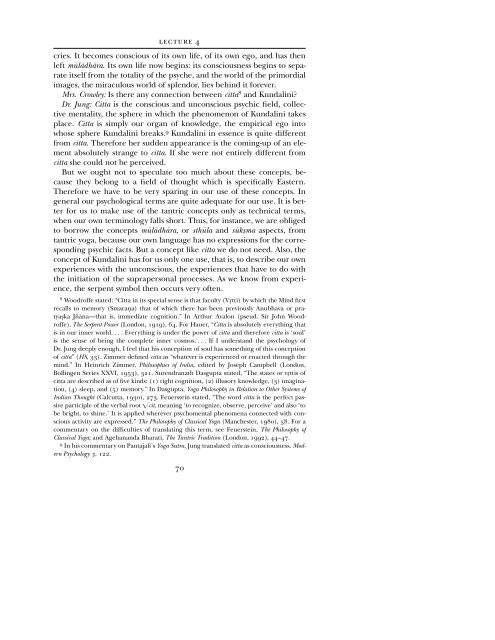CG JUNG - Countryside Anarchist
CG JUNG - Countryside Anarchist
CG JUNG - Countryside Anarchist
Create successful ePaper yourself
Turn your PDF publications into a flip-book with our unique Google optimized e-Paper software.
LECTURE 4<br />
cries. It becomes conscious of its own life, of its own ego, and has then<br />
left mÖlvdhvra. Its own life now begins: its consciousness begins to separate<br />
itself from the totality of the psyche, and the world of the primordial<br />
images, the miraculous world of splendor, lies behind it forever.<br />
Mrs. Crowley: Is there any connection between citta8 and Kundalini?<br />
Dr. Jung: Citta is the conscious and unconscious psychic field, collective<br />
mentality, the sphere in which the phenomenon of Kundalini takes<br />
place. Citta is simply our organ of knowledge, the empirical ego into<br />
whose sphere Kundalini breaks. 9 Kundalini in essence is quite different<br />
from citta. Therefore her sudden appearance is the coming-up of an element<br />
absolutely strange to citta. If she were not entirely different from<br />
citta she could not be perceived.<br />
But we ought not to speculate too much about these concepts, because<br />
they belong to a field of thought which is specifically Eastern.<br />
Therefore we have to be very sparing in our use of these concepts. In<br />
general our psychological terms are quite adequate for our use. It is better<br />
for us to make use of the tantric concepts only as technical terms,<br />
when our own terminology falls short. Thus, for instance, we are obliged<br />
to borrow the concepts mÖlvdhvra, orsthÖla and sÖküma aspects, from<br />
tantric yoga, because our own language has no expressions for the corresponding<br />
psychic facts. But a concept like citta we do not need. Also, the<br />
concept of Kundalini has for us only one use, that is, to describe our own<br />
experiences with the unconscious, the experiences that have to do with<br />
the initiation of the suprapersonal processes. As we know from experience,<br />
the serpent symbol then occurs very often.<br />
8 Woodroffe stated: “Citta in its special sense is that faculty (Vùtti) by which the Mind first<br />
recalls to memory (Smaraõa) that of which there has been previously Anubhava or pratyaüka<br />
Jñvna—that is, immediate cognition.” In Arthur Avalon (pseud. Sir John Woodroffe),<br />
The Serpent Power (London, 1919), 64. For Hauer, “Citta is absolutely everything that<br />
is in our inner world. . . . Everything is under the power of citta and therefore citta is ‘soul’<br />
is the sense of being the complete inner cosmos. . . . If I understand the psychology of<br />
Dr. Jung deeply enough, I feel that his conception of soul has something of this conception<br />
of citta” (HS, 33). Zimmer defined citta as “whatever is experienced or enacted through the<br />
mind.” In Heinrich Zimmer, Philosophies of India, edited by Joseph Campbell (London,<br />
Bollingen Series XXVI, 1953), 321. Surendranath Dasgupta stated, “The states or vùttis of<br />
citta are described as of five kinds: (1) right cognition, (2) illusory knowledge, (3) imagination,<br />
(4) sleep, and (5) memory.” In Dasgupta, Yoga Philosophy in Relation to Other Systems of<br />
Indian Thought (Calcutta, 1930), 273. Feuerstein stated, “The word citta is the perfect passive<br />
participle of the verbal root �cit, meaning ‘to recognize, observe, perceive’ and also ‘to<br />
be bright, to shine.’ It is applied wherever psychomental phenomena connected with conscious<br />
activity are expressed.” The Philosophy of Classical Yoga (Manchester, 1980), 58. Fora<br />
commentary on the difficulties of translating this term, see Feuerstein, The Philosophy of<br />
Classical Yoga; and Agehananda Bharati, The Tantric Tradition (London, 1992), 44–47.<br />
9 In his commentary on Pantajali’s Yoga Sutra, Jung translated citta as consciousness. Modern<br />
Psychology 3, 122.<br />
70


